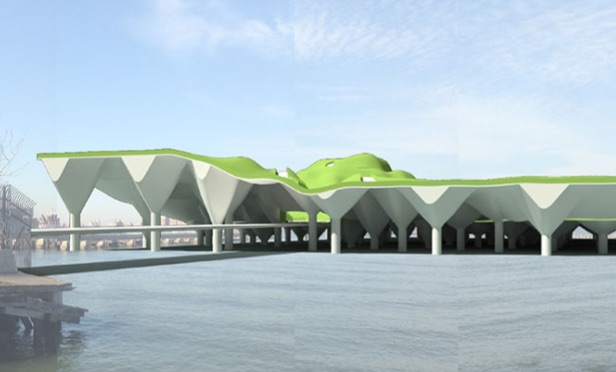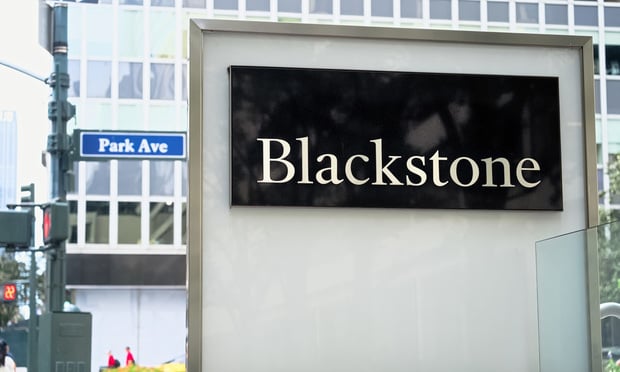
NEW YORK CITY—In an unexpected dramatic plot twist, the construction of Pier 55 has been revived. Gov. Andrew Cuomo brokered an agreement with the multiple parties in dispute over the project. The governor anticipates that the proposed 2.7-acre island structure, which will have a performance center and rise seven stories above the waters off the Hudson River shoreline—will debut during his next term of office, if reelected.
Just last month, Pier 55's funder, billionaire Barry Diller, chair of IAC and Expedia, pulled out of the project. Estimated costs had swelled to $250 million. In pre-construction costs alone, Diller had paid $40 million dollars, and the proposal remained mired in litigation.
But on Wednesday, Cuomo announced he had productive conversations with the City Club of New York. The civic advocacy non-profit agreed to cease its litigation to halt the project. “Pier 55 will go forward, and we will work cooperatively to complete the full vision for the park,” Cuomo said.
Real Estate Board of New York President John Banks who was not a party in the dispute, stated the “historic announcement” by Cuomo was a win for the people of New York. “I want to thank the governor for his leadership to complete this visionary project and for his commitment to protect the Hudson River and Hudson River Park.”
Upon learning the litigation would not be pursued, Diller said, “I'm going to make one last attempt to revive the plans to build the park, so that the intended beneficiaries of our endeavor can fall in love with Pier 55 in the way all of us have.”
In a GlobeSt.com interview, the City Club president, Michael Gruen, explained the group's decision to end the litigation. “We feel that we accomplished a major part of what we wanted to do, which was to protect the estuary and sanctuary, and we received a favorable ruling from a federal court on that,” he said.
When the park was formed in 1998, there were assurances about maintaining wildlife and ecological conditions. The estuary was to be used for strictly water dependent activities such as boating, swimming and fishing. U.S. District Court Judge in the Southern District of New York Lorna Schofield ruled that the Hudson River Park Trust would have to follow those restrictions in the future.
Douglas Durst, the billionaire real estate developer, who had financially supported the City Club's lawsuit said, “My goal has always been the completion of the park and the protection of the Hudson River. Today's agreement is a major step in that direction.” He thanked the governor for his role in the development.
Cuomo said the litigation which prevented the project from moving forward, unfortunately, created a lost opportunity for all New Yorkers.
However, Gruen emphasized even with the Pier 55 case, the City Club advocates for good government on behalf of all New Yorkers.
The City Club alleged a full environmental impact statement should have been completed but was not done. In addition, the legislature's consent was granted for reconstructing the old Pier 54. The proposal was not a reconstruction in any conventional sense but for “a totally different project at a different location,” Gruen said.
The City Club asserted that projects involving more than $1 million in capital costs require a competitive bidding process, which did not occur. Although the developer is building the structure, the City of New York must contribute $17 million to the costs. The development project will pay the Trust $1 in rent for up to 30 years. The Trust pays for maintenance of the pier's surface. Finally, at the end of 30 years, the Trust will take possession of the pier, when it will be undoubtedly in a far more dilapidated state.
The non-profit group objected to the language of the Trust's lease, which covered ticketing prices and private functions on the pier. Certain text could exclude large segments of the population. For example, the lease included a provision that 50% of tickets to an event could be sold at fair market prices, which was undefined. Gruen pointed out, “With market prices, we all know, in New York tickets can run as high as $1,200.”
The constructed island will require more than 550 foundation poles. According to the architectural renderings, two blocks or 400 feet of river would be completely blocked from an eye-level view, standing on the shore.
Although satisfied with the environmental protection of the sanctuary, Gruen understands compromises required in settlement. “Unfortunately, there are times when one feels that it wasn't quite right, that we shouldn't have lost but that's the life of the law,” he said.

Just last month, Pier 55's funder, billionaire Barry Diller, chair of IAC and Expedia, pulled out of the project. Estimated costs had swelled to $250 million. In pre-construction costs alone, Diller had paid $40 million dollars, and the proposal remained mired in litigation.
But on Wednesday, Cuomo announced he had productive conversations with the City Club of
Real Estate Board of
Upon learning the litigation would not be pursued, Diller said, “I'm going to make one last attempt to revive the plans to build the park, so that the intended beneficiaries of our endeavor can fall in love with Pier 55 in the way all of us have.”
In a GlobeSt.com interview, the City Club president, Michael Gruen, explained the group's decision to end the litigation. “We feel that we accomplished a major part of what we wanted to do, which was to protect the estuary and sanctuary, and we received a favorable ruling from a federal court on that,” he said.
When the park was formed in 1998, there were assurances about maintaining wildlife and ecological conditions. The estuary was to be used for strictly water dependent activities such as boating, swimming and fishing. U.S. District Court Judge in the Southern District of
Douglas Durst, the billionaire real estate developer, who had financially supported the City Club's lawsuit said, “My goal has always been the completion of the park and the protection of the Hudson River. Today's agreement is a major step in that direction.” He thanked the governor for his role in the development.
Cuomo said the litigation which prevented the project from moving forward, unfortunately, created a lost opportunity for all New Yorkers.
However, Gruen emphasized even with the Pier 55 case, the City Club advocates for good government on behalf of all New Yorkers.
The City Club alleged a full environmental impact statement should have been completed but was not done. In addition, the legislature's consent was granted for reconstructing the old Pier 54. The proposal was not a reconstruction in any conventional sense but for “a totally different project at a different location,” Gruen said.
The City Club asserted that projects involving more than $1 million in capital costs require a competitive bidding process, which did not occur. Although the developer is building the structure, the City of
The non-profit group objected to the language of the Trust's lease, which covered ticketing prices and private functions on the pier. Certain text could exclude large segments of the population. For example, the lease included a provision that 50% of tickets to an event could be sold at fair market prices, which was undefined. Gruen pointed out, “With market prices, we all know, in
The constructed island will require more than 550 foundation poles. According to the architectural renderings, two blocks or 400 feet of river would be completely blocked from an eye-level view, standing on the shore.
Although satisfied with the environmental protection of the sanctuary, Gruen understands compromises required in settlement. “Unfortunately, there are times when one feels that it wasn't quite right, that we shouldn't have lost but that's the life of the law,” he said.
Want to continue reading?
Become a Free ALM Digital Reader.
Once you are an ALM Digital Member, you’ll receive:
- Breaking commercial real estate news and analysis, on-site and via our newsletters and custom alerts
- Educational webcasts, white papers, and ebooks from industry thought leaders
- Critical coverage of the property casualty insurance and financial advisory markets on our other ALM sites, PropertyCasualty360 and ThinkAdvisor
Already have an account? Sign In Now
*May exclude premium content© 2025 ALM Global, LLC, All Rights Reserved. Request academic re-use from www.copyright.com. All other uses, submit a request to [email protected]. For more information visit Asset & Logo Licensing.








